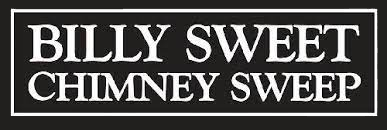by Billy Sweet | Dec 31, 2014 | Neglecting Chimney Maintenance
At first glance, chimneys seem very robust. They live outside all year, exposed to the elements, and can withstand hundreds of degrees worth of heat, fire after fire. Despite all of this, however, chimneys do need some regular care to keep up with these high demands. Industry experts strongly recommend having the chimney swept and inspected at least once every year and for good reason. Failure to keep up with chimney maintenance can have some devastating consequences.
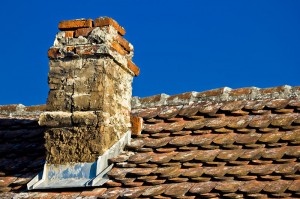
For wood burning fireplaces and stoves, the chimney will contain a buildup of a material called creosote. This black, tarry material clings to the surface of the chimney and can build up to the point of blocking air flow. Creosote is also highly flammable and is the cause of many destructive chimney fires. It burns at a much higher temperature than wood or gas, and once burning, it can be very difficult to extinguish. To keep your home and family safe, having a chimney sweep remove the creosote is imperative.
Debris found in the chimney can also take the form of an obstruction that reduces or blocks the flow of air. A common obstruction in the chimney is an animal and its nest. Warm chimneys attract small animals like birds, squirrels and raccoons that need a cozy space to wait out the winter. Unfortunately, this means trouble for the home owner. When the toxic fumes from the fire cannot escape through the chimney, they end up in the house. Not only does the creosote and soot leave messy, black residue on walls and furniture, but this lack of ventilation can actually be dangerous. Carbon monoxide, a product of combustion, can cause death when inhaled in high enough concentrations. It also has no color, smell, or taste, making it impossible to detect without relying on a special detector. To avoid the dangers of carbon monoxide from the fireplace, have a chimney sweep out every year.
Chimney inspections should also be done every year. The inspector examines the chimney from inside the house and from the roof to determine its structural soundness. A common problem that inspectors uncover is water damage. In a masonry chimney, water can enter the brick and mortar and cause cracking or even collapse. In all types of chimneys, water can also cause damage to the interior. If the flue lining is made of metal, water exposure can lead to rusted cracks or holes, which then exposes the house to further water damage, carbon monoxide leaks, and potential house fires. A simple inspection could determine if the chimney cap needs to be replaced, which can prevent these problems most of the time.
All in all, failure to keep up with chimney maintenance could cost you money in repairs, your house, and even your life. Instead of risking it, just call to schedule your annual sweep and inspection today. If you live near Boston, Massachusetts or Portland, Maine, contact Billy Sweet Chimney Sweep to speak with a professional.
by Billy Sweet | Dec 19, 2014 | Seasoned Firewood
Staying warm this winter requires the proper preparation. For maintaining a comfortable temperature inside the home, this could involve starting a fire in the wood burning stove or fireplace. To ensure the hottest, most fuel efficient fire, you have to start off with the best firewood.
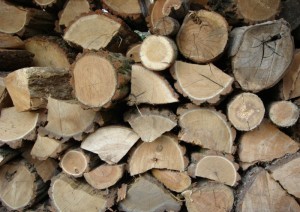
The most critical trait to consider in your firewood is the extent of its seasoning. To be seasoned is to have been allowed to dry fully by being stored indoors for a specific amount of time. Essentially, seasoned wood means dry wood. How long the wood needs to completely season varies based on the type of wood. Softer varieties of wood may season in six month, while hardwoods can require as long as two years to achieve completer dryness.
Preferably, any wood you burn should have been allowed to season completely prior to burning. To follow this guideline, you have two options. First, you can purchase wood that is already fully seasoned. This wood can be burned right away for the best fuel efficiency, but you may have a hard time finding it. If you do find well seasoned wood for sale, it probably costs significantly more than the wet wood. The other option is to purchase wet wood and allow it to season in a shed or garage. This option saves you upfront costs, but it involves planning one or two years in advance. Either option you choose, you should always burn seasoned wood. A lot of energy is wasted on wet wood by boiling away the trapped moisture, so you end up with a colder fire, excess smoke, more spent on fuel, and incompletely burnt wood.
Incompletely burnt wood creates health risks because it produces a black, tarry material called creosote. Initially a vapor as it exits the fire, creosote condenses inside the chimney. Over time the creosote can build up and restrict the air flow through the chimney, which can lead to poor indoor air quality. The high flammability of creosote can also result in a chimney fire from a mere stray ember. Luckily, avoiding this risk is as easy as burning seasoned wood and having an annual chimney sweep and inspection done.
Just because you purchase seasoned wood does not mean it stays seasoned forever. How you store the wood after you buy it and before you burn it determines whether or not it remains fully seasoned. The ideal storage arrangement involves stacking the wood, with a depth of only one log, in a shed or other outdoor building. Leave the wood uncovered to prevent condensation. If the wood must sit outside, protect it from the elements by creating a sturdy roof for it. A piece of sheet metal works well. Be sure to leave the sides of the stack uncovered to encourage air flow.
If you have any questions about firewood or if you need to schedule a chimney sweep or inspection, contact Billy Sweet Chimney Sweep to speak with an expert.
by Billy Sweet | Oct 30, 2014 | Chimney Draft Problems
November has begun, which means fall is closing in on its halfway point already. Especially in the northeast, this means less daylight and colder temperatures. Most people have given up on wearing sandals and shorts, and instead, they do not leave the house without at least a jacket and a scarf. Homeowners have likely resorted to heating up their homes at least once this season, and for those with fireplaces or stoves, that may mean lighting up a toasty fire. While many people have a basic idea of how the chimney works, using the fireplace most effectively might require a little more knowledge. Specifically, if you want to save more money by avoiding draft problems with your chimney, you may want to read on for how to catch the problem and resolve it.
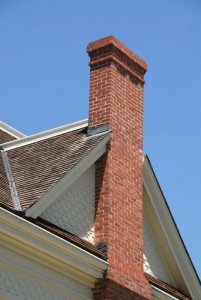
Chimneys function based on the idea that hot air rises. When a fire has been lit in the fireplace, the hot gases produced by it are less dense than the surrounding air, so the hot air moves up through the chimney. Fires are generally burned during the fall and winter seasons, so the riding hot air eventually meets the colder, denser, outside air somewhere in the chimney. This pressure differential results in an upward pull on the air, creating an air flow known as a “draft.” The draft pulls the air from the home into the fire, fueling it with oxygen, and then sends the smoke and gases from the fire outside through the chimney. When this process does not happen properly, you run into what is known as a draft problem.
Draft problems can occur for a few different reasons, but no matter how you spin it, they cost you money. One common draft problem is an oversized chimney. With older fireplaces especially, large chimneys are a common problem. The wider a chimney is the more space the hot air can spread out in, which means the air cools faster and rises slower. With the rise of air significantly slowed down, the pull of the draft loses its strength. This can cause your fire to burn at a cooler temperature or even go out completely. Your mason can remedy this problem by determining the proper chimney width your fireplace and chimney require and installing a flue lining to match.
A chimney that is too short can also cause a draft problem. The taller your chimney is, the more powerful the draft will be. Therefore, if your chimney is too short, a common issue in older bungalows or ranch homes, it cannot create an adequate draft to keep a strong, hot fire going. While this issue is more expensive to address, your mason can walk you through the process of adding height to your chimney. This will save you money in the long run by preventing cold air from creating a draft going into your home instead of out.
If you worry about draft problems costing your money in your home, contact your local mason today. The area of Boston and North Shore, Massachusetts and Portland, Maine are all served by Billy Sweet Chimney Sweep, so if you live in one of these areas, contact Billy Sweet for a professional consultation.
by Billy Sweet | Aug 25, 2014 | Chimney Maintenance, chimney sweep
Now that summertime is coming to a close and the kids have returned to school, we can enjoy shift into fall. The time of year filled with changing colors, crunchy leaves and pumpkin carving has begun, in addition to the promise of cooler weather. While the first few days of fall might warm up in remembrance of a sizzling summer, the weather will eventually cool off. Before you know it, snow will cover the ground in the midst of a furious New England winter.
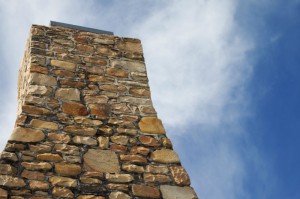
Usually, now is when everyone shuts off the central air conditioning and opens the windows to keep everyone comfortable in the house. For many, starting up the fireplace is a passing thought in the back of their mind, but sooner or later the time will come to build that first fire. These same people who fail to remember their fireplaces until high time must battle the busiest season to find a service person who is free to inspect and clean their chimney.
Instead of rushing right before your holiday get-together to have your chimney cleaned, schedule a date for regular maintenance now. Starting in fall, the chimney cleaning services are swamped, and it lasts through the holidays. Many companies book up several weeks in advance at this time, and as the weeks go by and the temperature drops, any snow and ice may make it impossible to get on the roof anyway.
Call Billy Sweet Chimney Sweep today to make an appointment to have your chimney swept and inspected. Billy Sweet Chimney Sweep works out of Eastern Massachusetts, Southern New Hampshire, and the Portland, Maine area.
This business provides reasonably priced chimney sweeping services in addition to inspections that meet the most up to date codes set by the National Fire Protection Association. Along with each inspection, Billy Sweet offers a courtesy video scanning of the inside of your chimney with Chim-scan products. You receive a comprehensive overview of the condition of your chimney with this closed circuit video inspection, and it aids you in making the right decision on repairs and updates.
You should have your fireplace and chimney inspected once every year, but especially if you recently moved into a new house, your fireplace has been inactive for an extended time or if you have run into any problems with the fireplace. The freeze-thaw cycle of a New England winter and any water leaks into the masonry may result in structural harm to the chimney, which needs to be inspected annually. If a fireplace has lay dormant for some time, such as since it was used last winter, pests like birds may have made a home of the chimney and created an obstructed vent. Lighting a fire in a fireplace with a clogged vent poses serious risks to your house and family.
With summer wrapping up and fireplace time quickly approaching, right now is the best time to make your chimney sweep and inspection appointment with Billy Sweet Chimney Sweep.
